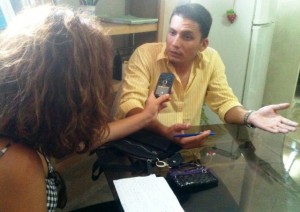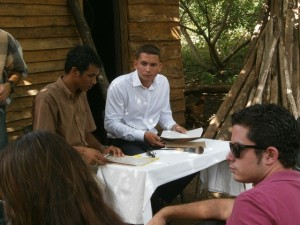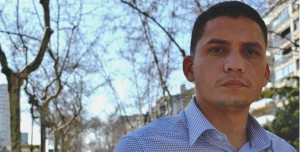 Cubanet interviewed Eliezer Avila, the computer scientist who once faced Ricardo Alarcon, former president of the National Assembly. He moved to the capital in order to participate more directly in the changes in civil society.
Cubanet interviewed Eliezer Avila, the computer scientist who once faced Ricardo Alarcon, former president of the National Assembly. He moved to the capital in order to participate more directly in the changes in civil society.
What have you been doing in your public life lately?
Since I arrived in Europe I have focused on my personal life. One of my biggest frustrations was that I’ve always lived nearly 500 miles from the capital (in Puerto Padre, Las Tunas). I had to take a bus or a train and travel sometimes for days in order to participate in public life, which is not only all that is written which overseas readers may read, but what happens in debates within of Cuba, within the intelligentsia who, with or without criticism, is what touches us.
We must mention the debates of the journals Temas [Themes], Espacio Laical [Lay Space], a series of good debates, in which I want to participate. Then, making an effort to be able to insert myself in a more coherent and consistent way in public life, I have had to spend the last two months to stabilize my life in the city of Havana.
From your previous social work we perceived you as a human rights activist and then a freelance journalist. But you have defined yourself as a politician. So: What political leaning do you identify with? Socialism, Social Democracy, Liberalism?

I said in an interview with Bayly (in Miami) recently, that I define myself as a rational politician, perhaps a mix of “liberal center.” The truth is that I have infinite belief in individual freedom as the sole driving force of initiative, progress, the maximum effort to get ahead, and freedom. Now, I also believe in social responsibility, and I believe in a government that offers opportunities.
In European politics, as far as I could see, especially in the Nordic countries, there is a strong tendency for political rationality. That is, the issue we are talking about is the specific issue of what we should do. We don’t have to look through black or white glasses. We are going to study the issue in its totality and make a decision that at times could be a little to the left and at times a little to the right. The truth is it’s looking for the better good. I lean that way.
There are a ton of projects there that don’t consider economics, but the tendency of the left says that we have to do them because they sustain a group of services, of subsidies, because this is a social policy of interest to the left. But, well, it’s an economic disaster, that ends up undoing the policy itself because of the lack of resources to sustain what remains on the large screening, that can’t even sustain itself, and then, which way do I lean? For a balance between what is efficient and what is necessary.
Although you have defined yourself as a politician, Somos + [We Are More] is not a party but a movement. Has it been founded yet?
We are at the stage of conceptualization. I’m trying to gather a nucleus of people, especially young people; university students, workers. I’m looking for young people who aspire to have a future in Cuba. We can design a proposal addressing different subjects, in accordance with our dreams for a future for everyone in the country, including those who today make up a part of any political tendency.
The new acquisition of Somos + is a specialist in biology, who is designing the policy proposals in the environmental field, which in Cuban is disarmed. We want to have economists, sociologists, workers. That is, we want to have a directing nucleus of the Movement as diverse and comprehensive as possible. And we are engaged in this effort. We have not yet officially launched the Movement.
You also said that the Movement could accept some communists as members. What, then, is is precisely the purpose of Somos +?
 The point of departure of our Movement should be, above all, the most common demands of the largest possible number of Cubans. I know Communists who are Democrats. So, we are associating with tendency to the left, a hegemonic opinion, dictatorial, that doesn’t have to be that way. In Spain there are communists, in France, in Canada, the United States is full of communists who are democrats. Because they respects the rights of everyone else who are not communists to compete politically, fair and square, and to create a social balance, based on what we all think. Then, you can have whatever political position you have and at the same time be a democrat. What I will always defend is that our Movement is democracy. There’s no room for doubt about that. We will not accept people who are not democrats, that’s it. But for me, I don’t think it’s necessary to label people and ask them what color they are for them to be, in one way or another, a part of the Movement…
The point of departure of our Movement should be, above all, the most common demands of the largest possible number of Cubans. I know Communists who are Democrats. So, we are associating with tendency to the left, a hegemonic opinion, dictatorial, that doesn’t have to be that way. In Spain there are communists, in France, in Canada, the United States is full of communists who are democrats. Because they respects the rights of everyone else who are not communists to compete politically, fair and square, and to create a social balance, based on what we all think. Then, you can have whatever political position you have and at the same time be a democrat. What I will always defend is that our Movement is democracy. There’s no room for doubt about that. We will not accept people who are not democrats, that’s it. But for me, I don’t think it’s necessary to label people and ask them what color they are for them to be, in one way or another, a part of the Movement…
Have you been inspired by any movement within or outside Cuba to conceive the idea of the Somos+ Movement?
I would say I’ve had very broad influences. I have had excellent conversations with leaders of movements in Cuba. For example, José Daniel Ferrer, a person I admire and respect very much. Other people who are not actually a political movement, but they do have some very interesting ideas for the future of Cuba , such as Antonio Rodiles, Yoani Sanchez, Dagoberto Valdés and well, a long list… They have nurtured me in all this, but also the trip to Europe, especially to northern Europe, where I think they are the most balanced politics in the world… The German Green Party really left me very inspired… I like doing politics that way. A relaxed politics, no angry grand passions that try to move the world, a conversational politics. I saw in the German Parliament the most heated political discussions, and then everyone has a glass of wine, hugs each other, shakes hands.
This to me seems to be the best example I’ve seen of what we have on a small island. We don’t have to have these great conflicts that some people want to encourage until they’re unsalvageable. We have the same language, the same idiosyncrasies, we have the same aspirations. What do we want? A state of decent comfort, of dignity, a freedom of information that allows us to be believe we have entered the world, and we are not in a small cave in the Caribbean and that we are not part of the development.
We want to be respected for our work, we want to be paid, and according to this we can have the life we deserve.
Why are you leading Somos + instead of joining one of the already established movements within the opposition?
It has always seemed necessary to me for a new seed to be born, a new flower, that is not conditioned, permeated by a group of things that can be positive or negative but that have been longstanding.
It is good to assume responsibility for success if we achieve it, but also bear the weight of failure if it comes to that. It is very interesting to travel this whole road, we have the right, as a new generation, to make mistakes, to forge our way, to be neither better nor worse than those who started earlier and whose work I respect.
Now I want to ask questions to get an idea of your profile: What books do you read, what music do you like, what movies do you remember?
 I like old music, from the ‘70s and ‘80s, in English and in Spanish. As I am a computer scientist I’m passionate about programming sometimes whole nights, whole weeks, without going to bed, listening to a lot of hard rock, “System of a Down,” “Nightwish.” Movies: I very much like historic films, and adventures. I like all the movies about World War II, including the reflections of those who make you questions yourself, to think about the essence of humanity itself, above all, this capacity to create hatred. I really like “Life is Beautiful.” At the same time I very much like movies that exalt human valor. In books, as in movies, and in music, I like true stories. I was reading “The Rage and the Pride” by Oriana Fallaci. I finished reading the novels of Padura. I like Cuban writers who defined an era, with a writing that was very brave for its time, because it was ahead of many things that happened then.
I like old music, from the ‘70s and ‘80s, in English and in Spanish. As I am a computer scientist I’m passionate about programming sometimes whole nights, whole weeks, without going to bed, listening to a lot of hard rock, “System of a Down,” “Nightwish.” Movies: I very much like historic films, and adventures. I like all the movies about World War II, including the reflections of those who make you questions yourself, to think about the essence of humanity itself, above all, this capacity to create hatred. I really like “Life is Beautiful.” At the same time I very much like movies that exalt human valor. In books, as in movies, and in music, I like true stories. I was reading “The Rage and the Pride” by Oriana Fallaci. I finished reading the novels of Padura. I like Cuban writers who defined an era, with a writing that was very brave for its time, because it was ahead of many things that happened then.
How do you intend to add more people to Somos +, taking into account the fear that people have of reprisals from the government with its repressive apparatus?
First, I don’t think I should feel badly that no one has beaten me, I haven’t been in jail. Then, I think it is normal that it happens, that many people tell me, “I don’t want to sign up, I don’t want anything to happen to me.” You have to show these people that they are standing on safe ground. A ground in which I have confidence and which anyone can also rely on because there is nothing hidden. Political transparency can, in every sense, be a weapon that will help us to add many people.
The underground Cuban opposition has its advantages and disadvantages. One of the greatest fears that I have is that once we engage in politics in a democracy, too many people were accustomed to hiding.
This recent event with the musician Roberto Carcasses asking for changes at the concert of September 12, do you think it’s a sign of new times ?
I think so, recently I was talking to my wife. There are many people who are willing to assume some measure of responsibility for what touches them, according to their place in society, and I mean artists, intellectuals, many people who have responsibilities within the media …
People who travel, and Robertico Carcassés is one of them, they realize that in the whole world today a new wave is happening, they sometimes say, “Well good, the Arab countries are being shaken up.” I think the whole world is being shaken up…. These people who travel, who leave, they are seeing everything that is happening, when they get to Cuba it’s like traveling back in time 54 years… Sometimes there are situations like that of Robertico Carcasses, which I think it was mostly an awakening of consciousness that marks a before and after. It marks a precedent, as did what happened at the University of Information Sciences (UCI) as well.
With that speech I had the opportunity to make … It raised the bar a little of what would be done and what could be criticized, and after there was a trend in the newspaper Granma, in the News, of creating spaces where people began to discuss a set of issues . Well, I think it is very healthy and very necessary for a country to have things happen like with Robertico Carcassés … Far from being the exception, it should be the rule.
It’s said that the reforms within Raul Castro’s government are a fraudulent change, and that one of their tactics is the replace the real opposition, organic within the society, with what the spokespeople themselves have called a “loyal opposition.” If you agree with this opinion, what do you think of this phenomenon?
Today what we have in this second stage, to give it a name, in the government of Raul Castro, is a setback, including a discourse that already seems to come from the past. We have seen once again the pioneers reciting with their neck veins bulging, almost in the style of the “open platform.” We have reading in the newspaper again these discourses that label things “Revolutionary” and “truly Revolutionary,”or that abuse the word Revolutionary.
Yes, but when I gave the example of what they call loyal opposition, I was thinking of places like the official blogosphere, where there is a certain amount of criticism, but it is fabricated by the government to create an impression of openness…
I also include that in what I was saying. In any of those spaces even La Joven Cuba could enter, but the result is that you can fool some of the people some of the time, but you can not fool All of the people forever. These spaces were opened and people began to feel a catharsis there. It turns out that criticism is only the first link in a chain of a process that should end with political decisions. Then, something very interesting has happened in Cuba, it is that we have already talked too much. We bring too many years of criticizing.
Lilianne Ruiz, From Cubanet
4 October 2013
